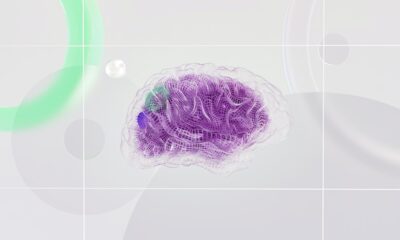With the “one-size-fits-all” approach being the norm in the psychiatric industry, HMNC Brain Health is aiming to shake this up through targeted and personalised therapies powered by predictive diagnostics.
Current mental healthcare treatment currently leaves a lot to be desired for some people, with an approximate 100 million people living with treatment-resistant depression (TRD) across the globe. In light of this, HMNC Brain Health wants to bring personalised care into mental health to meet this high, unmet need.
Professor Florian Holdboer worked for 30 years at the Max Planck Institute of Psychiatry before founding HMNC in 2010.
The company is aiming to innovate mental health care through the development of specific treatments with increased efficacy and reduced side effects, and will be harnessing genomics and Artificial Intelligence (AI) to develop them.
Earlier this year HMNC embarked on a joint venture with Develco Pharma to create the company Ketabon – a project developing a prolonged-release oral ketamine formulation for TRD.
A 30-year history in psychiatry
With Holdboer’s understanding of the link between mental health and genetics, he developed a very comprehensive asset portfolio comprising three compounds, treating both major depressive disorder as well as treatment-resistant disorder.
He also developed proprietary molecular diagnostic tests to identify those patients who would respond to treatments.
“Holdboer started to talk about precision medicine in mental health long before this became the standard in oncology,” said CEO, Benedikt Von Braunmuhl, speaking to Psychedelic Health.
“He was interested in how to treat depression and mental health disorders by selecting the right drugs for the right patients. His philosophy is that one-size-fits-all does not work, and mental health over the last few decades has not seen a lot of innovation.
“There’s a high unmet medical need. A third of depression patients are treatment-resistant, which means that they are not responding to two consecutive treatments and this was exactly what his frustration was around. He tried to identify approaches to resolve that.”
Developing innovative treatments for unmet needs
HMNC’s ketamine programme has an investigator-initiated study ongoing at the University of Zurich in Switzerland, and the company hopes to see results soon.
Chief clinical development officer, Hans Eriksson, said: “We are developing targeted therapies for depressed people. We have three different clinical programmes in our portfolio right now which are all focused on depression. They are based on a selection of patients.
“Two of these projects use genetic tests to select patients, and one of them is using more standard tests to select patients for treatment resistance. The Ketabon programme is built around ketamine, which has been around for many years as a dissociative anaesthetic. It has had lots of interest focused on its use at lower doses as an antidepressant.
“There is no doubt that ketamine is an efficacious antidepressant but it has been difficult to get rid of the dissociative side effects that many patients experience as less pleasant. Those side effects plus the tendency towards a transient blood pressure increase has really affected the labels that regulators have applied to esketamine around the world, with the need for medical supervision.
“We believe that we have the opportunity to maintain the good efficacy of ketamine but to decrease the tolerability issue. We are trying to do this by the use of an oral sustained release formulation that releases ketamine into the blood at a much lower rate than we see with the nasal spray and with the IV formulations.”
The compound has already been tested in both Phase I and Phase II studies in pain patients, which have indicated a good tolerability profile and no associated side effects or blood pressure increases.
“Our aspiration is to bring the principle of ketamine to depressed patients, but without the tolerability issues,” added Eriksson.
“I’ve always been frustrated when I’ve seen the very wide variability of clinical presentations of depression, and everyone is diagnosed as having major depressive disorder. It seems so reasonable that there are different biologies at play here. Our absolute intention is to try to find these biologies and find specific interventions for them.”
Pioneering psychiatric care with precision medicine and ketamine
Current drugs in psychiatric care utilise mechanisms that were explored in the 50s, all developed with broad populations in mind. Some people respond well to these medications, but for those that don’t, it can be difficult to find hope in available care.
HMNC’s two other projects centre around the hypothalamus-pituitary-adrenals axis (HPA axis), an important physiological mechanism in the human body. The HPA axis is often referred to as the stress access – as these organs are involved in the way the brain signals to the adrenals to produce the human stress hormone cortisol.
The company has now developed a compound – BH-200 – which specifically targets the dysfunction of the axis which it will use alongside a biomarker test. This type of testing is currently standard in areas such as oncology, for example, however, the development has yet to be utilised for mental health care.
“As clinicians, we have never had the tools to find the patients who would respond exceedingly well. That means that we have had to fall into a sort of trial and error practice. If we could shortcut this and actually find the right medication at the earlier point in time, it will be very helpful for patients and also for society, because we will be able to get to the root of the disorder much faster,” said Eriksson.
“I think the wealth of data with ketamine is impressive. We believe that by using this oral ketamine, with a slow buildup of concentration, we will be able to reap the benefits of the antidepressant ketamine without having the problems.
“There has been a tremendous change in medical and psychiatric drug development over the last five to seven years. These medications that, at one point in time, were frowned upon and seen only as drugs of abuse are now being explored. It is a real Renaissance for more advanced psychopharmacology. I think this is probably the second golden age in psychopharmacology.”
Braunmuhl added: “That’s why I was so excited to join HMNC – when I saw this approach at the company and met the team I realised that this is the first company to do this in mental health.
“Everyone has a relationship to someone with a mental health disorder or even depression, and the stigma is becoming less problematic. People are talking about it more and realising that we have a solution.
“I think mental health will become the most important disease. For example, in 2030 depression is set to become be the most prevalent disease in the world, surpassing cancer. There is also the socio-economic impact of mental health disorders as a whole. If you look at the last few years, solutions are becoming more and more targeted and personalised.
“This is a tremendous opportunity for all of us here to contribute to the solution.”
[activecampaign form=52]

 Opinion2 years ago
Opinion2 years ago
 Insight3 years ago
Insight3 years ago
 Medicinal2 years ago
Medicinal2 years ago
 Research2 years ago
Research2 years ago
 Medicinal2 years ago
Medicinal2 years ago
 Markets & Industry1 year ago
Markets & Industry1 year ago
 News3 years ago
News3 years ago
 Medicinal2 years ago
Medicinal2 years ago


















